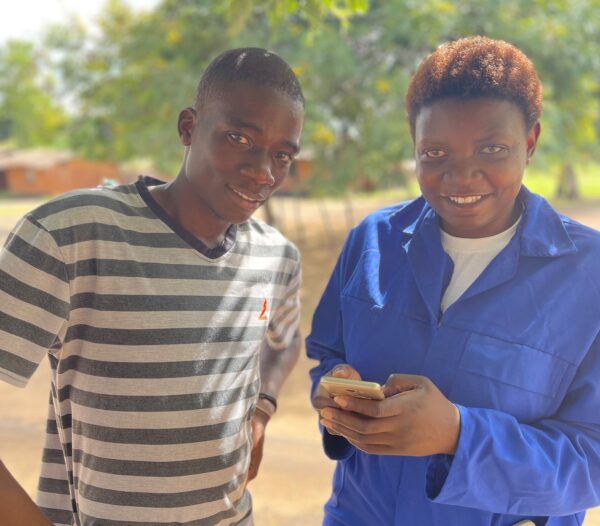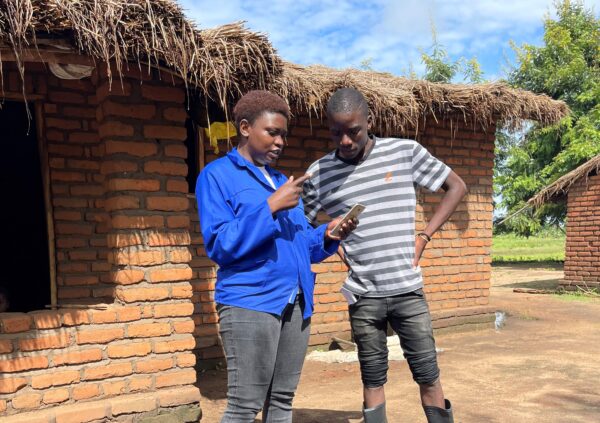“Protecting people from diseases is the number one thing that we as health officers need to do in our communities,” says Lilian Chimbayo, an environmental health officer who works to assess and improve the conditions that prevent diseases and promote healthy communities in the Nkhotakota district of Malawi.
Malawi has been experiencing one of its worst disease outbreaks in more than a decade, with more than 27,500 cases of cholera recorded nationwide as of mid-January 2023. The outbreak started in March 2022 in the Southern region, with cases in Nsanje and Machinga districts, and then spread to all 29 districts in the country. When the cholera epidemic reached Nkhotakota in August 2022, Lilian’s job got a lot harder, as she is also the district’s integrated disease surveillance and response coordinator.
“When the outbreak started in the northern part of Nkhotakota, we were finishing round three of the polio supplementary immunization activity. We were still following COVID-19 prevention measures. We needed to start giving cholera vaccines,” Lilian recalls. “It was a little overwhelming at times, but we had success in integrating all of these interventions.”
The district health team was also anticipating the start of yet another health activity—the October indoor residual spraying (IRS) campaign, when long-lasting insecticide is applied on the walls of homes to kill malaria-transmitting mosquitoes. The annual IRS campaign in Nkhotakota is supported by the U. S. President’s Malaria Initiative (PMI) through the VectorLink Project and is critical to preventing malaria, particularly during the rainy season (January-April) when cases spike. PMI and the District Health Office partner to spray over 100,000 structures in just a few weeks in order to protect more than 400,000 people across the district. While preparing for the annual IRS campaign against malaria in October, PMI expanded its efforts to assist the Nkhotakota District Health Office with the cholera crisis.

Environmental Health Officer Lilian Chimbayo (right) and Data collector Hope Makulula during the data quality audit following the IRS spray campaign in Traditional Authority Kalimanjira. Photo credit: Abdoulaye Bangoura, VectorLink Malawi.
But first, PMI had to deal with a major challenge: its main IRS operations site in Ngala was being used to treat cholera patients. The project worked with the district to identify a better location for the cholera treatment services and supported the transportation of tents from Lilongwe to Nkhotakota to house the sick patients. PMI then disinfected the original area twice, prior to setting up the IRS operations site. The whole area was fenced in and staffed with extra security to prevent cross contamination and make sure both the cholera treatment center and the IRS campaign could continue safely.
Realizing the critical importance of each health activity—conducting the IRS campaign, managing the cholera outbreak, and continuing with polio vaccines—PMI and the District Health Office decided to integrate all the respective community engagement efforts. This approach allowed for a more efficient deployment of the environmental health officers, community health workers, and volunteers who are central to delivering crucial information to those receiving the health services.
In the lead-up to the spray campaign, each mobilizer met with village homeowners to provide information about the IRS campaigns and how to prevent cholera and COVID-19. Also, during this time, the district health team was struggling to transport cholera-fighting supplies where they were most needed, with fuel shortages leaving their vehicles grounded. “There was a shortage of fuel, so we couldn’t move the supplies of intravenous (IV) fluids to health facilities,” notes Lilian. “PMI helped us with transport to do that.”

Lilian Chimbayo and Hope Makulula during the post-spray data quality audit. Photo credit: Abdoulaye Bangoura, VectorLink Malawi.
Just as Lilian and her colleagues were doing everything they could do to save lives, PMI VectorLink Malawi Chief of Party Abdoulaye Bangoura was committed to keeping the hundreds of seasonal IRS workers undertaking the campaign safe and healthy.
“In all of our trainings before the spraying, and then again in our daily morning meetings each day throughout the month-long campaign, we emphasized cholera prevention messages to spray teams to keep them safe,” says Abdoulaye. In addition to providing supplies of hand sanitizer and ongoing health guidance, PMI ensured that spray team supervisors conducted health checks of spray operators every day, to make sure all seasonal staff were healthy. These efforts paid off, with none of PMI VectorLink’s staff, including the 500+ seasonal workers, contracting cholera.
Months after the IRS campaign’s conclusion, Malawi’s cholera crisis continues unabated, part of a global surge that may be aggravated by climate change, as warmer temperatures and increased rainfalls make it easier for the bacteria that cause cholera to spread. Lilian Chimbayo believes that for Malawi, coordination and integration is the key to overcoming this and future crises.
“Look at our results. We were successful in these interventions, coordinating and integrating out of necessity,” she says. “Going forward, we have so many health activities that can be planned together like immunization and malaria prevention campaigns. With government and project staff planning together, we can be more effective and efficient.”
Cover photo: Zelita Benda, at right, addresses IRS spray operators at an operations site in Dwangwa, Malawi, including remarks about cholera prevention. Photo credit: Abdoulaye Bangoura, VectorLink Malawi.
